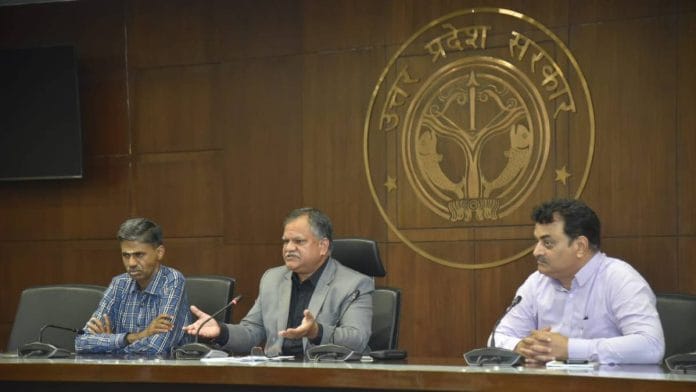Lucknow: Uttar Pradesh government has made district magistrates (DM) responsible for bringing in investment into their respective areas of jurisdiction and increasing the credit-deposit (CD) ratio of their districts by linking the effort with their annual appraisal.
Investment flow in a particular district will thus impact the annual appraisal of these senior officers, who will now have to mention about the increase in investment and the CD ratio in their district in the column for self-appraisal in their annual performance appraisal report.
The CD ratio is a key indicator of a state’s economic development.
Addressing the first press conference of his tenure, UP chief secretary Manoj Kumar Singh Friday said the “historic decision” had been taken on the directions of state chief minister Yogi Adityanath.
“In the Global Investors Summit organised by the government, a total of Rs 40 lakh crore of investment has been received which will make employment possible for 1.5 crore people. In order to speedily bring this investment to the ground, the role of DMs and divisional commissioners should be (widened). In this respect, the state government has taken this decision,” he said.
Emphasising that investment helps create employment and jobs for youth, Singh said DMs and divisional commissioners will now monitor it yearly.
“They will have to mention about the investment and credit-deposit ratio in their district in their annual confidential report (ACR) … what was the increase in investment in their tenure, what was the rise in credit-deposit ratio during the same…,” he added.
Stating that investment figures in their districts will be a factor in the evaluation of their ACRs, Singh said DMs whose districts succeed in getting more investment will be honoured.
“In April each year, DMs and divisional commissioners will be informed about credit-deposit ratio of their districts,” he said, adding Sambhal and Amroha were observed to have the highest CD ratio in 2023, while Unnao, Balrampur, Bahraich and Shravasti had the lowest.
Also Read: Mayawati didn’t sack nephew to get closer to BJP. UP Dalit voters are switching sides
Investment & employment opportunities targets
The UP government Thursday issued an order in connection with the same, detailing how the move will be implemented. In the order, which is in possession of ThePrint, the chief secretary has told all DMs and divisional commissioners that in the district/commissionerate regions, their role is essential from the investment point of view.
“It is very important that this role not be limited to identifying land availability, land use conversion, giving permission for purchase of over 12.5 acre of land and regulatory permissions, etc, but be (made) wider. The DMs at the district-level and the divisional commissioners at the commissionerate level can do close surveillance of the work of big industrial establishments and also stay in contact with them. In their view, these officers are in a position to proactively promote and encourage and attract investment in their districts/commissionerates,” the document states.
It further highlights that Section II of The All India Services (Performance Appraisal Report) (Amendment) Rules, 2019, pertains to self-appraisal.
“In their APAR-performance appraisal report, DMs and divisional commissioners will mention about how much monetary investment was made possible with their efforts during the year. Along with this, they will mention how many employment opportunities were created due to this investment,” it says.
According to the government order, implementation of the district credit plan is also the responsibility of the DM/divisional commissioner.
The document states that after consultation with the Reserve Bank of India, institutional finance department of the UP government will inform DMs/divisional commissioners about the CD ratio of districts at the start of the year and towards its end, the officers will analyse the increase/change in the ratio in their performance appraisal report.
In a post on X Friday, Singh said it was the aim of the UP government to bring the CD ratio to 65 percent quickly, adding that it would accelerate banking and industrial activities.
“Under the able leadership of the CM and because of the immense possibilities in the state and a secure environment suitable for investment, global companies are looking at the state as an investment base in different regions. Global investment initiative and strong efforts will prove helpful in achieving the goal of making UP a $1 trillion economy,” he stated.
CM Adityanath had Wednesday said that the gross state domestic product of UP was projected to reach Rs 32 lakh crore by 31 March, 2025, and highlighted UP’s economic accomplishments, enhanced security measures, industrial progress and stringent actions against the mafia.
Even before the cabinet formation for Yogi 2.0 in 2022, the state had invited bids for appointment of a consultant to formulate a strategy and roadmap to achieve the “herculean” target of making UP a $1 trillion economy in five years, which would mean boosting the state economy by five times.
While the process was initiated in June 2020 in Yogi 1.0, the appointment could not be completed in the previous regime and a period of more than one-and-a-half year witnessed the process of issuance of request for proposal, its revision, floating of bids, their amendment and subsequent cancellation.
On the 78th independence day this year, the Adityanath government also set the ambitious target of transforming UP into a zero-poverty state by lifting the poorest families above the poverty line within a year.
(Edited by Nida Fatima Siddiqui)
Also Read: 2024 election mandate in UP is more against Yogi than Modi






